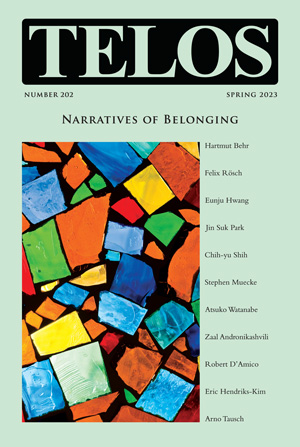In today’s episode of the Telos Press Podcast, David Pan talks with Chih-yu Shih about his article “Loving Hong Kong: Unity and Solidarity in the Politics of Belonging,” from Telos 202 (Spring 2023). An excerpt of the article appears here. In their conversation they discuss why liberalism is based on universal love rather than universal rights; the relationship between a rights-based liberalism and communitarianism in the West; the difference between Western universal love and Confucian benevolent love; solidarity love and role-embedded love; the Confucian critique of universal love; the meaning of “One Country, Two Systems” in Hong Kong; how the idea of benevolent love affects the understanding of “One Country, Two Systems” in comparison with the liberal idea of it; the different interpretations, based on universal love and benevolent love, of the 2014 and 2019 protests in Hong Kong; the links between benevolent love and stability and prosperity and between universal love with autonomy and political rights, and why there is a conflict between these two sets of goals. If your university has an online subscription to Telos, you can read the full article at the Telos Online website. For non-subscribers, learn how your university can begin a subscription to Telos at our library recommendation page. Print copies of Telos 202 are available for purchase in our online store.
|
In today’s episode of the Telos Press Podcast, David Pan talks with Stephen Muecke about his article “Belonging in Aboriginal Australia: A Political ‘Cosmography,'” from Telos 202 (Spring 2023). An excerpt of the article appears here. In their conversation they discuss how cosmography rather than ethnography allows for a focus on epistemological and ontological pluralism, and what such pluralism means for the essay’s cosmographic analysis; whether ontological pluralism is fundamentally incompatible with monotheistic religion and the institutions that have derived from it; how important for the essay’s analysis is institutional belonging, and whether the centering effect of such belonging could conflict with an ontological pluralism; how Native Title in the Australian legal system is grounded in the idea of genealogy, and whether this orientation undermines or contradict the forms of title and territorial sovereignty documented in Goolarabooloo practices; and the key differences between the Goolarabooloo practices and Yawuru nationalism. If your university has an online subscription to Telos, you can read the full article at the Telos Online website. For non-subscribers, learn how your university can begin a subscription to Telos at our library recommendation page. Print copies of Telos 202 are available for purchase in our online store. Telos 202 (Spring 2023): Narratives of Belonging is now available for purchase in our store. Individual subscriptions to Telos are also available in both print and online formats. Online subscribers have access to the full issue at the Telos Online website. The following is an excerpt from the issue’s introduction by Hartmut Behr and Felix Rösch, who are the issue’s guest editors. Introduction: Narratives of Belonging—The Interrelation between Ontological-Epistemological Observations and Narrative MethodologyHartmut Behr and Felix Rösch 1. Introduction
|
||||
|
Telos Press Publishing · PO Box 811 · Candor, NY 13743 · Phone: 212-228-6479 Privacy Policy · Data Protection Copyright © 2024 Telos Press Publishing · All Rights Reserved |
||||








